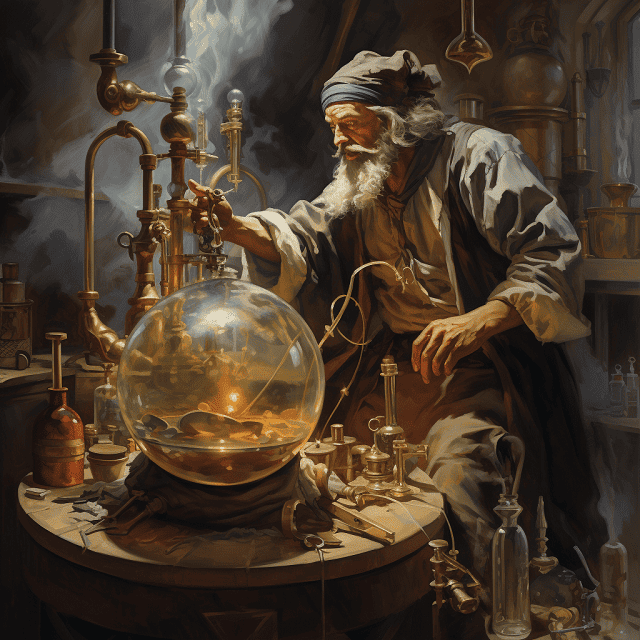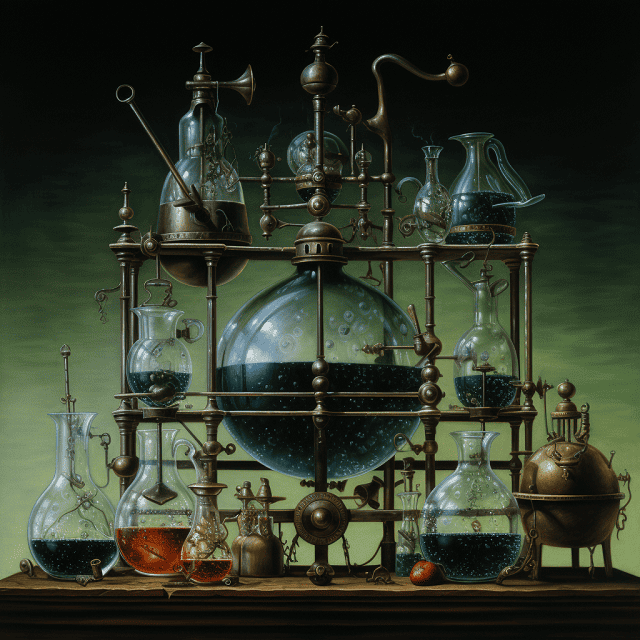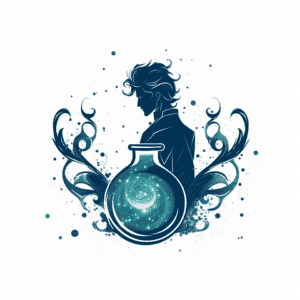Ever wondered about the blurred line between science and magic? You’re not alone. Alchemy, often shrouded in mystery and misconceptions, is a fascinating subject that’s both scientific and mystical. In this article, you’ll explore the origins, evolution, and principles of alchemy, meet notable alchemists, and debunk common myths. So, buckle up ’cause we’re about to delve into the captivating world of alchemy—where science meets magic.
Understanding the Origin and Evolution of Alchemy
You’re about to delve into the fascinating history of alchemy, discovering its origins and how it’s evolved over time. Alchemy, a term you might associate with medieval sorcerers and their attempts to transform base metals into gold, has roots reaching far deeper than you might think. Its beginnings can be traced back to Hellenistic Egypt around the 4th century BC, where it was a combination of metallurgy, mysticism, and medicine.
As you trace its journey, you’ll find alchemy wasn’t confined to one culture or era. It spread across continents and centuries, reaching the Islamic world by the 8th century AD. Here, it bloomed with the translation and preservation of Greek texts, combining with Islamic philosophy and spiritual practices. You can’t overlook the fact that some of the most influential alchemical texts and theories came from this period.
Fast forward to the Middle Ages and Renaissance in Europe, alchemy’s evolution didn’t slow down. It was viewed as a potent blend of science and spirituality, with alchemists relentlessly pursuing not just material but also spiritual transmutation. It’s important to note that although their attempts to create gold were mostly fruitless, they developed techniques and equipment that would lay the groundwork for modern chemistry.
The Scientific Principles Behind Alchemy
In exploring the principles behind this ancient art, you’ll find it’s not all hocus pocus but grounded in some legitimate scientific theories. Alchemy, often mistaken as a mystical practice, actually encapsulates some fundamental scientific concepts.
One of the foundational principles of alchemy is the idea of transformation. It’s not about simply turning lead into gold, but rather, understanding the process of change at a fundamental level. Alchemists believed in the possibility of altering the properties of matter through specific processes. This principle isn’t so different from the modern scientific field of chemistry, where reactions are used to change the properties and states of substances.
Consider these points:
- Alchemy’s principles and practices:
- The principle of equivalent exchange:
- This is the belief that nothing can be gained without giving something in return. It’s a principle mirrored in the law of conservation of mass in modern physics, which states that matter cannot be created or destroyed.
- The process of distillation:
- Alchemists often used distillation as a method of purification, a technique that is still widely used in chemistry today.
In essence, alchemy was the birthplace of many modern scientific techniques and theories. It’s important to note, however, that while the principles of alchemy are scientifically grounded, the interpretation and application often diverged into mysticism. The challenge lies in separating the science from the myth, the fact from the fiction. In doing so, you’ll discover that alchemy is not just an arcane art, but a stepping stone to the scientific knowledge we have today.

The Mystical Aspects of Alchemy
While delving deeper into the topic, you’ll encounter a realm where the lines between fact and folklore blur, where mystical elements intertwine with the principles you’ve been studying. Alchemy, you’ll find, is not just the predecessor to modern chemistry; it’s a discipline steeped in symbolism, spirituality, and mysticism.
You’re no longer dealing with just the conversion of base metals into gold. You’re now venturing into the world of spiritual enlightenment and self-transformation—concepts as nebulous as they are tantalizing.
Let’s take a closer look at some of these mystical aspects:
| Aspect of Alchemy | Mystical Interpretation |
|---|---|
| Philosopher’s Stone | Symbol of ultimate enlightenment |
| Transmutation of metals | Personal growth and self-improvement |
| Alchemical potions | Spiritual purification and healing |
| Hermetic principles | Universal laws and spiritual truths |
| Alchemical symbols | Hidden wisdom and spiritual guidance |
These elements, while mysterious, are crucial to understanding alchemy’s dual nature. They’re not just about physical transformations; they’re metaphors for inner change and spiritual awakening. To the uninitiated, these concepts might seem abstract, even far-fetched. But for the alchemists, they were integral to their practice.
You’re now stepping into the more enigmatic part of your journey into alchemy. It’s a world where science and magic coalesce, where empirical facts meet esoteric wisdom. As you continue your exploration, remember to keep an open mind. These mystical elements, while challenging to grasp, offer invaluable insight into the holistic view of alchemy. It’s a fascinating, complex discipline—part science, part magic, and entirely captivating.
Notable Alchemists and Their Contributions
Now, let’s shift focus and delve into the lives and works of some notable figures who’ve greatly contributed to this fascinating discipline. Their intriguing stories and groundbreaking discoveries have shaped our understanding of alchemy, blurring the lines between science and magic.
- Isaac Newton:
- Not just an influential physicist, Newton was also a dedicated alchemist. He believed that alchemical transformation could reveal the fundamental structure of the universe.
- His alchemical experiments resulted in the development of new techniques in analysis and synthesis of substances.
- Jabir ibn Hayyan:
- Considered the father of chemistry, Hayyan made significant advancements in alchemy. He developed numerous chemical processes still in use today, like distillation and crystallization.
- His writings, packed with mystical symbolism, have played a crucial role in the development of both scientific and esoteric alchemy.
- Nicolas Flamel:
- Despite being a successful French scribe, Flamel is best known as an alchemist due to a posthumous biography claiming he discovered the Philosopher’s Stone.
- While there’s no historical evidence to support these claims, they’ve made Flamel one of the most recognized names in alchemy.
As you can see, these figures were not just mystical charlatans, but serious scholars and innovators. They’ve left a lasting legacy, shaping both the scientific and the esoteric aspects of alchemy. Their work continues to intrigue and inspire us, reminding us of the deeply intertwined nature of science and magic in this fascinating discipline. So, don’t let the mystery of alchemy deter you, instead, let it draw you in. Who knows, you might find yourself following in their illustrious footsteps.
Alchemy’s Influence on Modern Science
You might be surprised to learn how much of today’s chemistry owes its origins to these ancient practices. Alchemy, with its mystical symbols and complex processes, may seem more akin to magic than science. Yet, it’s the precursor of modern chemistry. It birthed concepts and methods still used today.
Consider the alchemical principle of transmutation, the idea of turning base metals into gold. While this might sound like magic, it’s actually not too dissimilar from nuclear reactions that change one element into another. Alchemists’ pursuit of the Philosopher’s Stone, a substance believed to grant eternal life, led to discoveries about the composition and properties of matter.
Alchemy also gave rise to the laboratory tradition. Alchemists were among the first to conduct systematic, controlled experiments. Their careful observations and meticulous record-keeping established the importance of empirical evidence in scientific investigations.
Below, you can see a snapshot of how alchemy has influenced modern science:
| Ancient Alchemy | Modern Science |
|---|---|
| Transmutation of base metals into gold | Nuclear reactions and atomic theory |
| Search for the Philosopher’s Stone | Understanding of matter and its properties |
| The laboratory tradition | Empirical evidence and systematic experiments |
Debunking Common Myths About Alchemy
Let’s dive into some common misconceptions that often cloud our understanding of this ancient practice. Alchemy, typically associated with mysticism and the quest to turn base metals into gold, is often misunderstood. However, it’s not all about the philosopher’s stone or elixirs of immortality.
Here are some misconceptions you should be aware of:
- Alchemy is purely magical or mystical:
- While alchemy does incorporate elements of mysticism, it’s not solely about magic. It’s a precursor to modern chemistry, involving experiments, observation, and analysis.
- Alchemists weren’t just trying to make gold; they were trying to understand the nature of matter and how it changes. They laid the groundwork for our understanding of chemical reactions.
- All alchemists were frauds or charlatans:
- Sure, there were those who exploited the hopes of the rich with promises of gold. But many were serious academics, like Isaac Newton, who contributed significantly to science.
- Alchemy was a legitimate field of study in its time, like physics or biology today. It was only later that it was discredited as pseudoscience.

Frequently Asked Questions
How Does Alchemy Relate to Modern Day Chemistry and Other Sciences?
Alchemy, you could say, is the foundation of modern chemistry. It’s where many basic concepts originated. Alchemists were the first to experiment with substances, aiming to transform base metals into gold. While their mystical elements don’t hold up to scientific scrutiny, their methodical practices paved the way for today’s empirical sciences. So, you see, alchemy’s relationship with modern day chemistry and other sciences is more about historical progression than direct correlation.
Are There Any Known Successful Attempts at Transmutation, the Main Goal of Alchemy?
You’re probably curious if there’ve been any successful attempts at transmutation, alchemy’s ultimate goal. Well, believe it or not, modern nuclear physics has indeed achieved this feat. We’re not talking turning lead into gold though. Instead, scientists use particle accelerators to change one element into another. It’s not magic, but the science behind it is utterly fascinating. So, in a way, you could say alchemy’s dream has been realized, just not in the way they envisioned.
Can You Provide a Detailed Explanation of the Alchemic Symbols and Their Meanings?
You’re asking about alchemical symbols and their meanings. These symbols often represent both physical elements and philosophical concepts. For instance, the symbol for gold, a circle with a point at its center, also signifies perfection and the sun. Mercury’s symbol, a cross topped by a horned circle, not only denotes the element but also fluidity and volatility. Understanding these symbols can give you a deeper insight into the rich, complex world of alchemy.
Is There Any Place or Culture Where Alchemy Is Still Practiced Today?
Yes, alchemy is still practiced today in some cultures. In China, for example, alchemical practices are ingrained in Traditional Chinese Medicine. You’ll also find it in Western esoteric traditions where it’s seen as a spiritual discipline. It’s not mainstream, but you’ll find pockets of practitioners worldwide who believe in the transmutation of substances or self-transformation. They’re not turning lead into gold, but they’re still fascinated by alchemy’s secrets.
What Are Some Popular Fictional Representations of Alchemy in Literature and Film?
You’ve likely encountered alchemy in the world of fiction, even if you didn’t realize it. It’s commonly depicted in literature and film, often viewed as a mystical blend of science and magic. J.K. Rowling’s “Harry Potter” series is a notable example, where the Philosopher’s Stone embodies alchemical principles. In cinema, “The Sorcerer’s Apprentice” features alchemy prominently. Also, the anime “Fullmetal Alchemist” is completely built around the concept of alchemy.
Conclusion
So, you’ve journeyed through the foggy landscapes of alchemy, straddling the line between science and magic. It’s like playing chess in the dark, isn’t it? You’ve learned that alchemists, like the brilliant Isaac Newton, laid the groundwork for modern chemistry. Yet, they also dabbled in the mystical, searching for immortality and wealth. Don’t let misconceptions fool you; alchemy isn’t just medieval hocus pocus. It’s a fascinating chapter of our scientific and cultural heritage.

